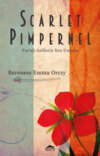Kitabı oku: «The League of the Scarlet Pimpernel», sayfa 14
VI
Esther, up in her little attic, knew nothing of what her English lover was even then suffering for her sake. She herself had passed, during the night, through every stage of horror and of fear. Soon after midnight that execrable brigand Rateau had poked his ugly, cadaverous face in at the door and peremptorily called for Lucienne. The woman, more dead than alive now with terror, had answered with mechanical obedience.
"I and my friends are thirsty," the man had commanded. "Go and fetch us a litre of eau-de-vie."
Poor Lucienne stammered a pitiable: "Where shall I go?"
"To the house at the sign of 'Le fort Samson,' in the Rue de Seine," replied Rateau curtly. "They'll serve you well if you mention my name."
Of course Lucienne protested. She was a decent woman, who had never been inside a cabaret in her life.
"Then it's time you began," was Rateau's dry comment, which was greeted with much laughter from his abominable companions.
Lucienne was forced to go. It would, of course, have been futile and madness to resist. This had occurred three hours since. The Rue de Seine was not far, but the poor woman had not returned. Esther was left with this additional horror weighing upon her soul. What had happened to her unfortunate servant? Visions of outrage and murder floated before the poor girl's tortured brain. At best, Lucienne was being kept out of the way in order to make her—Esther—feel more lonely and desperate! She remained at the window after that, watching that light in the house opposite and fingering her prayer-book, the only solace which she had. Her attic was so high up and the street so narrow, that she could not see what went on in the street below. At one time she heard a great to-do outside her door. It seemed as if some of the bloodhounds who were set to watch her had gone, or that others came. She really hardly cared which it was. Then she heard a great commotion coming from the street immediately beneath her: men shouting and laughing, and that awful creature's rasping cough.
At one moment she felt sure that Kennard had called to her by name. She heard his voice distinctly, raised as if in a despairing cry.
After that, all was still.
So still that she could hear her heart beating furiously, and then a tear falling from her eyes upon her open book. So still that the gentle patter of the rain sounded like a soothing lullaby. She was very young, and was very tired. Out, above the line of sloping roofs and chimney pots, the darkness of the sky was yielding to the first touch of dawn. The rain ceased. Everything became deathly still. Esther's head fell, wearied, upon her folded arms.
Then, suddenly, she was wide awake. Something had roused her. A noise. At first she could not tell what it was, but now she knew. It was the opening and shutting of the door behind her, and then a quick, stealthy footstep across the room. The horror of it all was unspeakable. Esther remained as she had been, on her knees, mechanically fingering her prayer-book, unable to move, unable to utter a sound, as if paralysed. She knew that one of those abominable creatures had entered her room, was coming near her even now. She did not know who it was, only guessed it was Rateau, for she heard a raucous, stertorous wheeze. Yet she could not have then turned to look if her life had depended upon her doing so.
The whole thing had occurred in less than half a dozen heart-beats. The next moment the wretch was close to her. Mercifully she felt that her senses were leaving her. Even so, she felt that a handkerchief was being bound over her mouth to prevent her screaming. Wholly unnecessary this, for she could not have uttered a sound. Then she was lifted off the ground and carried across the room, then over the threshold. A vague, subconscious effort of will helped her to keep her head averted from that wheezing wretch who was carrying her. Thus she could see the landing, and two of those abominable watchdogs who had been set to guard her.
The ghostly grey light of dawn came peeping in through the narrow dormer window in the sloping roof, and faintly illumined their sprawling forms, stretched out at full length, with their heads buried in their folded arms and their naked legs looking pallid and weird in the dim light. Their stertorous breathing woke the echoes of the bare, stone walls. Esther shuddered and closed her eyes. She was now like an insentient log, without power, or thought, or will—almost without feeling.
Then, all at once, the coolness of the morning air caught her full in the face. She opened her eyes and tried to move, but those powerful arms held her more closely than before. Now she could have shrieked with horror. With returning consciousness the sense of her desperate position came on her with its full and ghastly significance, its awe-inspiring details. The grey dawn, the abandoned wretch who held her, and the stillness of this early morning hour, when not one pitying soul would be astir to lend her a helping hand or give her the solace of mute sympathy. So great, indeed, was this stillness that the click of the man's sabots upon the uneven pavement reverberated, ghoul-like and weird.
And it was through that awesome stillness that a sound suddenly struck her ear, which, in the instant, made her feel that she was not really alive, or, if alive, was sleeping and dreaming strange and impossible dreams. It was the sound of a voice, clear and firm, and with a wonderful ring of merriment in its tones, calling out just above a whisper, and in English, if you please:
"Look out, Ffoulkes! That young cub is as strong as a horse. He will give us all away if you are not careful."
A dream? Of course it was a dream, for the voice had sounded very close to her ear; so close, in fact, that … well! Esther was quite sure that her face still rested against the hideous, tattered, and grimy coat which that repulsive Rateau had been wearing all along. And there was the click of his sabots upon the pavement all the time. So, then, the voice and the merry, suppressed laughter which accompanied it, must all have been a part of her dream. How long this lasted she could not have told you. An hour and more, she thought, while the grey dawn yielded to the roseate hue of morning. Somehow, she no longer suffered either terror or foreboding. A subtle atmosphere of strength and of security seemed to encompass her. At one time she felt as if she were driven along in a car that jolted horribly, and when she moved her face and hands they came in contact with things that were fresh and green and smelt of the country. She was in darkness then, and more than three parts unconscious, but the handkerchief had been removed from her mouth. It seemed to her as if she could hear the voice of her Jack, but far away and indistinct; also the tramp of horses' hoofs and the creaking of cart-wheels, and at times that awful, rasping cough, which reminded her of the presence of a loathsome wretch, who should not have had a part in her soothing dream.
Thus many hours must have gone by.
Then, all at once, she was inside a house—a room, and she felt that she was being lowered very gently to the ground. She was on her feet, but she could not see where she was. There was furniture; a carpet; a ceiling; the man Rateau with the sabots and the dirty coat, and the merry English voice, and a pair of deep-set blue eyes, thoughtful and lazy and infinitely kind.
But before she could properly focus what she saw, everything began to whirl and to spin around her, to dance a wild and idiotic saraband, which caused her to laugh, and to laugh, until her throat felt choked and her eyes hot; after which she remembered nothing more.
VII
The first thing of which Esther Vincent was conscious, when she returned to her senses, was of her English lover kneeling beside her. She was lying on some kind of couch, and she could see his face in profile, for he had turned and was speaking to someone at the far end of the room.
"And was it you who knocked me down?" he was saying, "and sat on my chest, and trussed me like a fowl?"
"La! my dear sir," a lazy, pleasant voice riposted, "what else could I do? There was no time for explanations. You were half-crazed, and would not have understood. And you were ready to bring all the nightwatchmen about our ears."
"I am sorry!" Kennard said simply. "But how could I guess?"
"You couldn't," rejoined the other. "That is why I had to deal so summarily with you and with Mademoiselle Esther, not to speak of good old Lucienne, who had never, in her life, been inside a cabaret. You must all forgive me ere you start upon your journey. You are not out of the wood yet, remember. Though Paris is a long way behind, France itself is no longer a healthy place for any of you."
"But how did we ever get out of Paris? I was smothered under a pile of cabbages, with Lucienne on one side of me and Esther, unconscious, on the other. I could see nothing. I know we halted at the barrier. I thought we would be recognised, turned back! My God! how I trembled!"
"Bah!" broke in the other, with a careless laugh. "It is not so difficult as it seems. We have done it before—eh, Ffoulkes? A market-gardener's cart, a villainous wretch like myself to drive it, another hideous object like Sir Andrew Ffoulkes, Bart., to lead the scraggy nag, a couple of forged or stolen passports, plenty of English gold, and the deed is done!"
Esther's eyes were fixed upon the speaker. She marvelled now how she could have been so blind. The cadaverous face was nothing but a splendid use of grease paint! The rags! the dirt! the whole assumption of a hideous character was masterly! But there were the eyes, deep-set, and thoughtful and kind. How did she fail to guess?
"You are known as the Scarlet Pimpernel," she said suddenly. "Suzanne de Tournai was my friend. She told me. You saved her and her family, and now … oh, my God!" she exclaimed, "how shall we ever repay you?"
"By placing yourselves unreservedly in my friend Ffoulkes' hands," he replied gently. "He will lead you to safety and, if you wish it, to England."
"If we wish it!" Kennard sighed fervently.
"You are not coming with us, Blakeney?" queried Sir Andrew Ffoulkes, and it seemed to Esther's sensitive ears as if a tone of real anxiety and also of entreaty rang in the young man's voice.
"No, not this time," replied Sir Percy lightly. "I like my character of Rateau, and I don't want to give it up just yet. I have done nothing to arouse suspicion in the minds of my savoury compeers up at the Cabaret de la Liberte. I can easily keep this up for some time to come, and frankly I admire myself as citizen Rateau. I don't know when I have enjoyed a character so much!"
"You mean to return to the Cabaret de la Liberte!" exclaimed Sir Andrew.
"Why not?"
"You will be recognised!"
"Not before I have been of service to a good many unfortunates, I hope."
"But that awful cough of yours! Percy, you'll do yourself an injury with it one day."
"Not I! I like that cough. I practised it for a long time before I did it to perfection. Such a splendid wheeze! I must teach Tony to do it some day. Would you like to hear it now?"
He laughed, that perfect, delightful, lazy laugh of his, which carried every hearer with it along the path of light-hearted merriment. Then he broke into the awful cough of the consumptive Rateau. And Esther Vincent instinctively closed her eyes and shuddered.
X
"NEEDS MUST—"
I
The children were all huddled up together in one corner of the room. Etienne and Valentine, the two eldest, had their arms round the little one. As for Lucile, she would have told you herself that she felt just like a bird between two snakes—terrified and fascinated—oh! especially by that little man with the pale face and the light grey eyes and the slender white hands unstained by toil, one of which rested lightly upon the desk, and was only clenched now and then at a word or a look from the other man or from Lucile herself.
But Commissary Lebel just tried to browbeat her. It was not difficult, for in truth she felt frightened enough already, with all this talk of "traitors" and that awful threat of the guillotine.
Lucile Clamette, however, would have remained splendidly loyal in spite of all these threats, if it had not been for the children. She was little mother to them; for father was a cripple, with speech and mind already impaired by creeping paralysis, and maman had died when little Josephine was born. And now those fiends threatened not only her, but Etienne who was not fourteen, and Valentine who was not much more than ten, with death, unless she—Lucile—broke the solemn word which she had given to M. le Marquis. At first she had tried to deny all knowledge of M. le Marquis' whereabouts.
"I can assure M. le Commissaire that I do not know," she had persisted quietly, even though her heart was beating so rapidly in her bosom that she felt as if she must choke.
"Call me citizen Commissary," Lebel had riposted curtly. "I should take it as a proof that your aristocratic sentiments are not so deep-rooted as they appear to be."
"Yes, citizen!" murmured Lucile, under her breath.
Then the other one, he with the pale eyes and the slender white hands, leaned forward over the desk, and the poor girl felt as if a mighty and unseen force was holding her tight, so tight that she could neither move, nor breathe, nor turn her gaze away from those pale, compelling eyes. In the remote corner little Josephine was whimpering, and Etienne's big, dark eyes were fixed bravely upon his eldest sister.
"There, there! little citizeness," the awful man said, in a voice that sounded low and almost caressing, "there is nothing to be frightened of. No one is going to hurt you or your little family. We only want you to be reasonable. You have promised to your former employer that you would never tell anyone of his whereabouts. Well! we don't ask you to tell us anything.
"All that we want you to do is to write a letter to M. le Marquis—one that I myself will dictate to you. You have written to M. le Marquis before now, on business matters, have you not?"
"Yes, monsieur—yes, citizen," stammered Lucile through her tears.
"Father was bailiff to M. le Marquis until he became a cripple and now I–"
"Do not write any letter, Lucile," Etienne suddenly broke in with forceful vehemence. "It is a trap set by these miscreants to entrap M. le Marquis."
There was a second's silence in the room after this sudden outburst on the part of the lad. Then the man with the pale face said quietly:
"Citizen Lebel, order the removal of that boy. Let him be kept in custody till he has learned to hold his tongue."
But before Lebel could speak to the two soldiers who were standing on guard at the door, Lucile had uttered a loud cry of agonised protest.
"No! no! monsieur!—that is citizen!" she implored. "Do not take Etienne away. He will be silent…. I promise you that he will be silent … only do not take him away! Etienne, my little one!" she added, turning her tear-filled eyes to her brother, "I entreat thee to hold thy tongue!"
The others, too, clung to Etienne, and the lad, awed and subdued, relapsed into silence.
"Now then," resumed Lebel roughly, after a while, "let us get on with this business. I am sick to death of it. It has lasted far too long already."
He fixed his blood-shot eyes upon Lucile and continued gruffly:
"Now listen to me, my wench, for this is going to be my last word. Citizen Chauvelin here has already been very lenient with you by allowing this letter business. If I had my way I'd make you speak here and now. As it is, you either sit down and write the letter at citizen Chauvelin's dictation at once, or I send you with that impudent brother of yours and your imbecile father to jail, on a charge of treason against the State, for aiding and abetting the enemies of the Republic; and you know what the consequences of such a charge usually are. The other two brats will go to a House of Correction, there to be detained during the pleasure of the Committee of Public Safety. That is my last word," he reiterated fiercely. "Now, which is it to be?"
He paused, the girl's wan cheeks turned the colour of lead. She moistened her lips once or twice with her tongue; beads of perspiration appeared at the roots of her hair. She gazed helplessly at her tormentors, not daring to look on those three huddled-up little figures there in the corner. A few seconds sped away in silence. The man with the pale eyes rose and pushed his chair away. He went to the window, stood there with his back to the room, those slender white hands of his clasped behind him. Neither the commissary nor the girl appeared to interest him further. He was just gazing out of the window.
The other was still sprawling beside the desk, his large, coarse hand—how different his hands were!—was beating a devil's tatoo upon the arm of his chair.
After a few minutes, Lucile made a violent effort to compose herself, wiped the moisture from her pallid forehead and dried the tears which still hung upon her lashes. Then she rose from her chair and walked resolutely up to the desk.
"I will write the letter," she said simply.
Lebel gave a snort of satisfaction; but the other did not move from his position near the window. The boy, Etienne, had uttered a cry of passionate protest.
"Do not give M. le Marquis away, Lucile!" he said hotly. "I am not afraid to die."
But Lucile had made up her mind. How could she do otherwise, with these awful threats hanging over them all? She and Etienne and poor father gone, and the two young ones in one of those awful Houses of Correction, where children were taught to hate the Church, to shun the Sacraments, and to blaspheme God!
"What am I to write?" she asked dully, resolutely closing her ears against her brother's protest.
Lebel pushed pen, ink and paper towards her and she sat down, ready to begin.
"Write!" now came in a curt command from the man at the window. And Lucile wrote at his dictation:
"MONSIEUR LE MARQUIS,—We are in grave trouble. My brother Etienne and I have been arrested on a charge of treason. This means the guillotine for us and for poor father, who can no longer speak; and the two little ones are to be sent to one of those dreadful Houses of Correction, where children are taught to deny God and to blaspheme. You alone can save us, M. le Marquis; and I beg you on my knees to do it. The citizen Commissary here says that you have in your possession certain papers which are of great value to the State, and that if I can persuade you to give these up, Etienne, father and I and the little ones will be left unmolested. M. le Marquis, you once said that you could never adequately repay my poor father for all his devotion in your service. You can do it now, M. le Marquis, by saving us all. I will be at the chateau a week from to-day. I entreat you, M. le Marquis, to come to me then and to bring the papers with you; or if you can devise some other means of sending the papers to me, I will obey your behests.—I am, M. le Marquis' faithful and devoted servant,
LUCILE CLAMETTE."
The pen dropped from the unfortunate girl's fingers. She buried her face in her hands and sobbed convulsively. The children were silent, awed and subdued—tired out, too. Only Etienne's dark eyes were fixed upon his sister with a look of mute reproach.
Lebel had made no attempt to interrupt the flow of his colleague's dictation. Only once or twice did a hastily smothered "What the–!" of astonishment escape his lips. Now, when the letter was finished and duly signed, he drew it to him and strewed the sand over it. Chauvelin, more impassive than ever, was once more gazing out of the window.
"How are the ci-devant aristos to get this letter?" the commissary asked.
"It must be put in the hollow tree which stands by the side of the stable gate at Montorgueil," whispered Lucile.
"And the aristos will find it there?"
"Yes. M. le Vicomte goes there once or twice a week to see if there is anything there from one of us."
"They are in hiding somewhere close by, then?"
But to this the girl gave no reply. Indeed, she felt as if any word now might choke her.
"Well, no matter where they are!" the inhuman wretch resumed, with brutal cynicism. "We've got them now—both of them. Marquis! Vicomte!" he added, and spat on the ground to express his contempt of such titles. "Citizens Montorgueil, father and son—that's all they are! And as such they'll walk up in state to make their bow to Mme. la Guillotine!"
"May we go now?" stammered Lucile through her tears.
Lebel nodded in assent, and the girl rose and turned to walk towards the door. She called to the children, and the little ones clustered round her skirts like chicks around the mother-hen. Only Etienne remained aloof, wrathful against his sister for what he deemed her treachery. "Women have no sense of honour!" he muttered to himself, with all the pride of conscious manhood. But Lucile felt more than ever like a bird who is vainly trying to evade the clutches of a fowler. She gathered the two little ones around her. Then, with a cry like a wounded doe she ran quickly out of the room.










